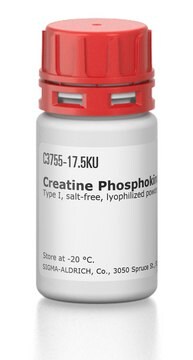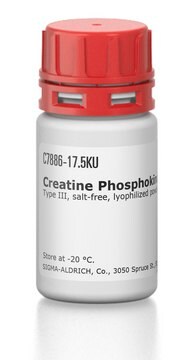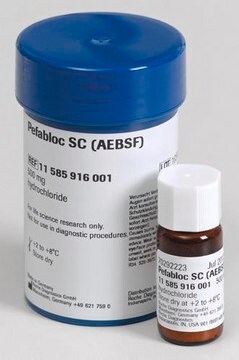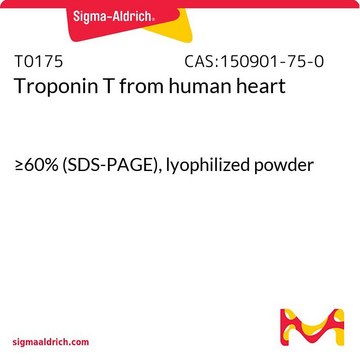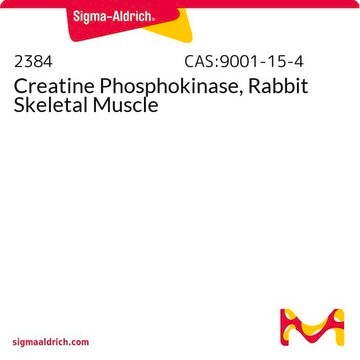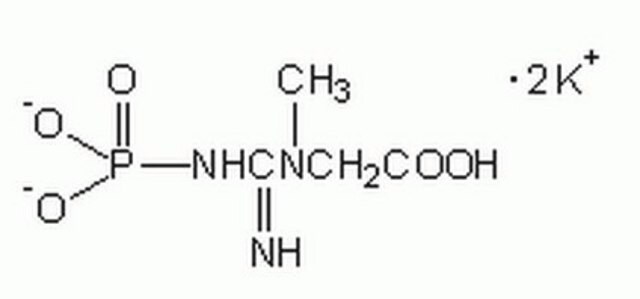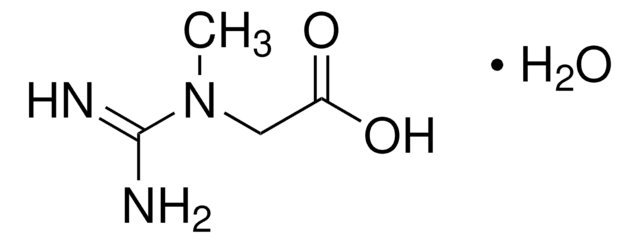C9858
Creatine Kinase MM Fraction from human heart
lyophilized powder
Synonym(s):
CK-MM Fraction, Human CK MM, Human Creatine Kinase
Sign Into View Organizational & Contract Pricing
All Photos(1)
About This Item
Recommended Products
Specificity
One unit will transfer 1.0 μmole of phosphate from creatine phosphate to ADP per minute at 37 °C (measured at 340 nm as one equimolar amount of NADH produced by coupled reaction).
Application
Creatine kinase MM fraction from human heart has been used in a study to investigate the importance of intraoperative and postoperative cardiac medical therapy in emergency coronary artery bypass grafting for acute myocardial infarction. Creatine kinase MM fraction from human heart has also been used in a study to investigate the circadian dependence of infarct size and left ventricular function after ST slevation myocardial infarction.
Biochem/physiol Actions
May be used as a control or calibrator in monitoring myocardial injury.
Warning
All human source materials have tested negative for HIV1, HIV2, HCV antibodies and HbsAg. No test guarantees a product to be non-infectious. Therefore, all material derived from human fluids or tissues should be considered as potentially infectious.
Unit Definition
One unit will transfer one micromole of phosphate from creatine phosphate to ADP per minute at 37 deg C.
Physical form
Lyophilized powder containing Tris-HCl, EDTA and N-acetyl cysteine.
Storage Class Code
11 - Combustible Solids
WGK
WGK 3
Flash Point(F)
Not applicable
Flash Point(C)
Not applicable
Certificates of Analysis (COA)
Search for Certificates of Analysis (COA) by entering the products Lot/Batch Number. Lot and Batch Numbers can be found on a product’s label following the words ‘Lot’ or ‘Batch’.
Already Own This Product?
Find documentation for the products that you have recently purchased in the Document Library.
Customers Also Viewed
Akira Sato et al.
Journal of the American College of Cardiology, 59(8), 730-738 (2012-02-22)
This study evaluated the clinical value of myocardial contrast delayed enhancement (DE) with multidetector computed tomography (MDCT) for predicting clinical outcome after acute myocardial infarction (AMI). Although some studies have described the use of MDCT for assessment of myocardial viability
Akira Sezai et al.
Annals of thoracic and cardiovascular surgery : official journal of the Association of Thoracic and Cardiovascular Surgeons of Asia, 18(4), 338-346 (2012-05-11)
The results of emergency coronary artery bypass grafting (CABG) for acute myocardial infarction (AMI) are less than satisfactory, and readmission for cardiac events is common. 105 patients underwent emergency CABG for AMI. We examined the long-term results of emergency CABG
Ronald Reiter et al.
Circulation research, 110(1), 105-110 (2011-11-19)
In rodents, infarct size after ischemia/reperfusion exhibits a circadian dependence on the time of coronary occlusion. It is not known if a similar circadian dependence of infarct size occurs in humans. To determine if humans exhibit a circadian dependence of
Helen Lee et al.
The European journal of neuroscience, 31(8), 1388-1401 (2010-04-14)
Horizontal cells are lateral interneurons that participate in visual processing in the outer retina but the cellular mechanisms underlying transmitter release from these cells are not fully understood. In non-mammalian horizontal cells, GABA release has been shown to occur by
Our team of scientists has experience in all areas of research including Life Science, Material Science, Chemical Synthesis, Chromatography, Analytical and many others.
Contact Technical Service
